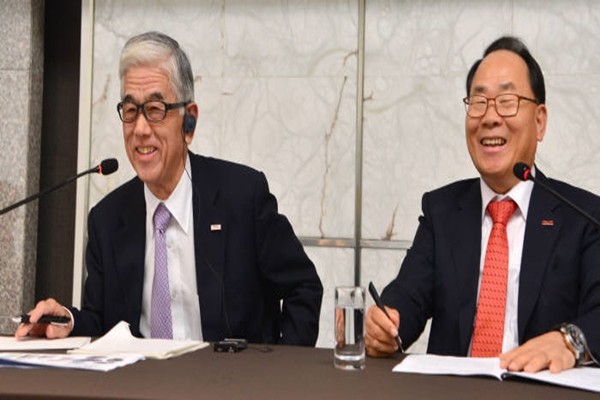Toray is planning to invest $885 million (1 trillion KRW) into South Korea until 2020 and invest $487 million (550 billion KRW) just into extending production lines for separator films of secondary batteries.
Toray held a press conference at Seoul Plaza Hotel on the 19th and introduced its plan to expand its South Korea business.
Toray is planning to invest $885 million (1 trillion KRW) into Korea Toray Group and its subsidiaries such as Toray Advanced Materials Korea, Toray Battery Separator Film Korea (TBSK), Toray Battery Separator Film Coating Korea (TBCK), and Stemco until 2020. Main purpose of this investment is to enhance its advanced material businesses such as electric and electronic parts, battery materials, materials for flexible displays, and engineering plastic.
It also introduced its goal of making $4.43 billion (5 trillion KRW) in sales from Korea Toray Group in 2020.
One of the most noticeable plans is its plan to invest more into battery business. Toray is planning to invest $487 million (550 billion KRW) into its separator film business for secondary batteries. It seems that it has made such plan to respond to increasing number of demands for batteries of electric vehicles. Lithium-ion battery is a major component of an electric vehicle and a separator film for a secondary battery is a necessary material for a battery.
Toray is planning to invest $177 million (200 billion KRW) into TBSK, which produces separator films for secondary batteries, in 2017 and another $177 million from 2019 to 2020. In 2020 when investment will be finished, production capacity of TBSK will be tripled to its current production capacity.
Toray is going to invest $133 million (150 billion KRW) into TBCK, which coats separator films produced by TBSK, from 2019 to 2020 and expand coating ability of TBCK.
“Our technical skills are equal to Asahi Kasei, which is the top company in markets for separator films.” said CEO Nikkaku Akihiro of Toray. “We will be able to have world’s best technical skills in two to three years.”
Toray is also planning to enhance its electronic component business.

Stemco, which is a joint company established by Toray and Samsung Electro-Mechanics, is planning to increase its output and enhance its new businesses. Its goal is to make $531 million (600 billion KRW) in annual sales by 2020.
Stemco is currently producing 1-Metal COF (Chip On Film), which forms fine wiring on top of polyimide film, and 2-Metal COF that is double sided. COF is used for flexible OLED display that goes into a mobile device.
Stemco invested about $44.3 million (50 billion KRW) with a goal of finishing extension of its production lines by next June. It will be able to have monthly production capacity of 15 million COFs after adding 4.4 million COFs through an extension. It is also going to start on new businesses such as multi-layer boards (3-layer boards and 4-layer boards) and ultra-fine wiring boards, module boards, and semiconductor boards.
“We are planning to continue to make facility and equipment investments not only to respond to demands in South Korea but also to respond to OLED demands in Japan and China.” said President Uhm Young Ha of Stemco. “Although it is difficult to estimate amount of supplies in a long term, we are going to carry out investments according to amount of demands that is out there on markets.”
Toray Advanced Materials Korea is planning to invest $102 million (115 billion KRW) and $88.5 million (100 billion KRW) into its Spunbond felt business, which is the number one in Asia, and PPS (Polyphenylene Sulfide) resin business respectively.
Besides these, Korea Toray Group is going to establish Korea Toray Science Promotion Foundation and start a volunteer group and expand its social contribution activities. This foundation will carry out variety of supports in different fields of basic sciences and is going to start them on full-scale in 2018.
Staff Reporter Lee, Youngho | youngtiger@etnews.com